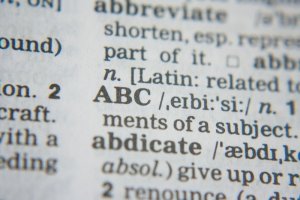 The Vocabulary of Real Estate Investing
The Vocabulary of Real Estate Investing
By Lou Gimbutis, Chief Homebuyer, Property Solutions, LLC
Much as with any highly specialized field of endeavor, R/E investing has a language of its own. A firm grounding in some of the more important terms can help you to grasp subtle nuances, and to more intelligently evaluate and make better distinctions, leading ultimately to wiser decisions.
We’ll start with the A’s, Amortization & ARM. Amortization has as its root the French word for death, and refers to the ever so slowly “killing off” of the principal portion of a mortgage. It is important that you understand that the interest on almost every mortgage you will ever get is heavily “front-weighted”. Where logic may suggest that the infamous “halfway point”, when your payments begin paying more principal than interest, is, well, halfway- year 15. It is actually in year 21. The average mortgage is refinanced in under 7 years, a statistic I urge you to consider deeply the implications of. Just when the “Golden Eggs” wax large, out comes the hatchet and we dine that evening on roast goose.
ARM stands for Adjustable Rate Mortgage, the term being self-explanatory. When you use an ARM, there are distinct advantages of leverage, but they must be carefully weighed against the potential havoc they can and have wrought on countless unsuspecting Investment Portfolios. Every one of them “seemed like a good idea at the time”. Recent legislation has taken some of the “sting” out of what these babies can do when they adjust, but buyer beware. They are normally pegged to an external index like Libor or the Fed rate, so when your rate begins to rise, you literally have not the faintest idea of the heights to which it may ascend. You may plan to sell the property in a year or two, but best you have a “Plan B”, lest you resemble that youth of Fairy tale fame who with great pride found that he was able to mount and ride a tiger, and with great chagrin found that he could never, ever get off.
For B we have another acronym widely used in recent years, BPO, or Broker Price Opinion. When a lender forecloses on a house, the value in today’s market in the as-is condition rarely bears any relation to the loan amount. Therefore, the base number generally used to price the house comes from a BPO. An Appraiser or a Real Estate Broker will put together a report for the bank on the probable selling price of the property, given its current condition, local market conditions, demand, and competitive inventory.
Continuing on with our alphabetical journey through the insider “jargon” of Real Estate Investing, “C” represents “Cash on Cash Return”. This is an incredibly important concept, and is integral to a proper understanding of the manner in which leverage can catapult your returns from Real Estate far beyond those of any other investment category (at least those with a respectable margin of safety, we’ll leave roulette and oil-drilling speculation out of the discussion).
Traditionally, if you make a $100K investment, and at the end of a year you retain your original investment (quite a feat in and of itself given the volatility of manty asset classes) as well as a profit of $8K, your return is 8%. However, in Real Estate, you may have used that same $100K to put $20K down on five single-family houses, and financed the rest. At the end of a year of proper management, tenants should be making those mortgage payments for you. If each house appreciated only $3,000, your profit is a respectable $15K. Although the Investment(s) increased in value far less than in the first example, your cash on cash return is a whopping $15K. (I’ve also heard that on occasion in Mecklenburg County, houses appreciate more than 3%)!
This increased return does not even take into account another huge benefit of Real Estate Investing, which is our “D” term, “Depreciation”. You see, the IRS allows you to take a deduction on Real Estate as if the value went down every year (it really goes up almost inevitably over the long term, but don’t go telling the IRS that!). This means that you get a tax deduction for your “loss” of value of the property (see your accountant for specifics). This makes Real Estate Investing wonderful for those who hold regular W-2 Income jobs, as the “loss” from Depreciation effectively renders part of the earned income from your job tax free! All jokes aside, this is a benefit the government offers in acknowledgment of the importance of property ownership and of the private sector in providing affordable housing.
Equity– most of us are aware of the general definition of equity: value minus debt equals equity. However, there is a phrase that is key to putting the importance of equity into its proper place:
You can’t eat equity.
In other words, equity is a wonderful thing on paper, but real estate is a relatively non-liquid investment- if an emergency arises, you cannot readily and immediately turn your equity into cash to meet the needs of a crisis.
For beginning investors, creating cash and cashflow should always come before considerations of equity. Equity will ultimately make you wealthy, but I have watched many an Investor crash and burn because they were not in a position to ride out a financial setback and unable to harvest their crop of equity fast enough to avoid disaster. It is entirely possible for an unbalanced portfolio to yield a million dollars of equity on paper, yet leave the Investor unable to pay the bills at the end of the month.
First Mortgage, or First Position Mortgage: This refers to the security position of a mortgage securing debt with real estate. In North Carolina, the earliest recorded mortgage is given first, or senior position. This becomes important if the buyer defaults on payments and a foreclosure is instituted. While a second or third mortgage (also known as a junior lienholder) can indeed institute a foreclosure if payments are not made as agreed, funds obtained from the foreclosure sale are allocated to pay off 100% of the first mortgage (this is not considering tax liens and other non-mortgage variables), and only after the first has been repaid in full do funds begin to go to the second mortgage, and so on.
Real Estate Investing has many facets, and some Investors make mortgage loans secured by investment Property. This can be done safely only after an accurate analysis of the value of the real estate, what it is likely to bring at foreclosure auction, and the costs of this auction (both legal and in terms of opportunity cost while funds are tied up yet bringing no return). A second position mortgage may be a safe investment, but only if the value is substantially greater than the amount of the first and second mortgage combined. Other Investors, myself included, specialize in investing in pre-foreclosure property.

